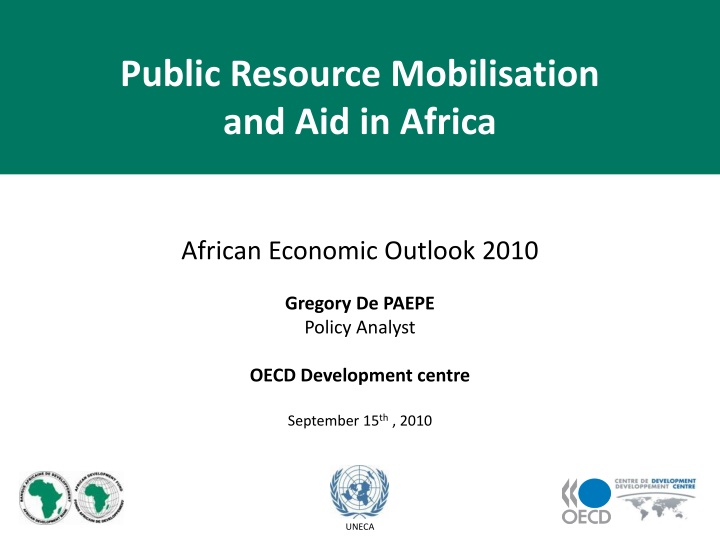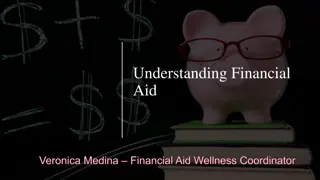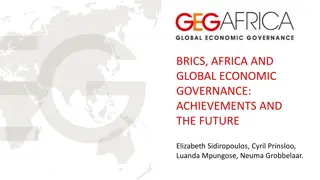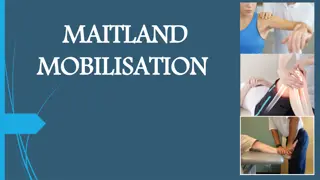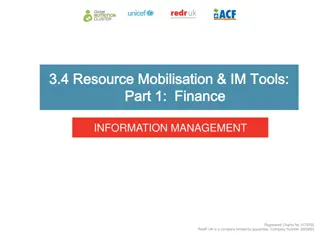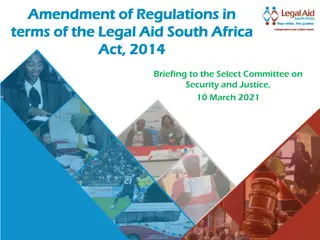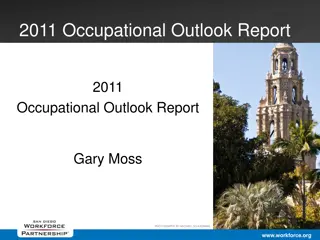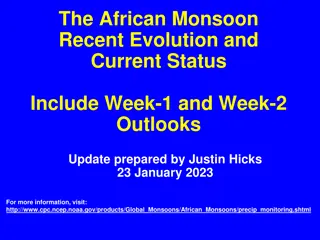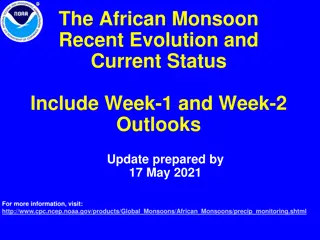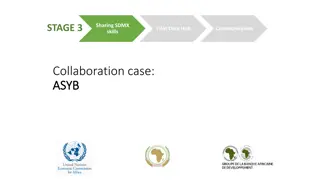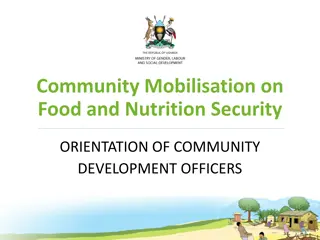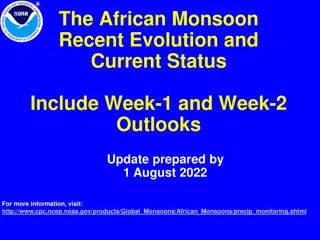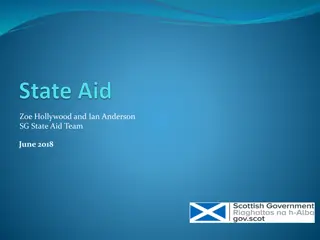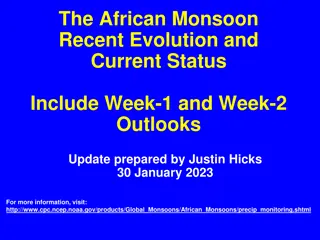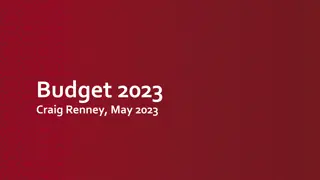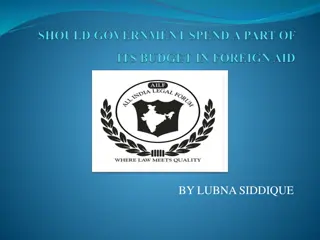Public Resource Mobilisation and Aid in Africa: Insights from African Economic Outlook 2010
Explore the key themes of public resource mobilization and aid in Africa from the African Economic Outlook 2010. This report delves into tax revenue, policy options, and the importance of mobilizing resources for development in Africa. It highlights the significance of utilizing own resources, building accountable states, and the impact on aid effectiveness.
Download Presentation

Please find below an Image/Link to download the presentation.
The content on the website is provided AS IS for your information and personal use only. It may not be sold, licensed, or shared on other websites without obtaining consent from the author.If you encounter any issues during the download, it is possible that the publisher has removed the file from their server.
You are allowed to download the files provided on this website for personal or commercial use, subject to the condition that they are used lawfully. All files are the property of their respective owners.
The content on the website is provided AS IS for your information and personal use only. It may not be sold, licensed, or shared on other websites without obtaining consent from the author.
E N D
Presentation Transcript
Public Resource Mobilisation and Aid in Africa African Economic Outlook 2010 Gregory De PAEPE Policy Analyst OECD Development centre September 15th , 2010 UNECA
AEO partners + coverage Lead partner (since 2007/08) Other partners UNECA Experts Network = 10 Independent African Think Tanks Financial partners (European Development Fund) From 47 to 50 countries = 99.5% of Africa s GDP = 97.3% of its population
Focusing on key structural issues every year Special annual focus: 2003: Privatisation 2004: Energy 2005: SMEs 2006: Transport 2007: Water and sanitation 2008: Technical & vocational skills development 2009: Innovation and ICT 2010: Public Resource Mobilisation and Aid
Public Resource Mobilization and Aid 1 Why Public Resource Mobilization 2 Taxes in Africa: some stylized Facts 3 Policy options
1. WHY PUBLIC RESOURCE MOBILIZATION The cornerstone of broad-based development Mobilising one s own resources for development Building accountable states Big bang for your aid buck Ownership & governance ODA < 50% tax revenue ODA > 50% tax revenue No available data Source: Development Centre, based on AEO country survey s, 2010.
2. SOME STYLISED FACTS Mobilising Africa s public resources: can and must be achieved 2000 1600 Tax revenue per capita 1200 ODA per capita USD 800 Average Median 400 0 Burundi Niger Kenya Benin Mauritania Egypt Uganda Mali Cameroon Zambia Chad Congo Sierra Leone Guinea Comoros** Djibouti Nigeria Morocco Botswana Algeria Malawi* Ghana** Mauritius South Africa Ethiopia Rwanda Togo S o Tom & Principe Namibia Angola Sudan Tunisia Gabon Seychelles Liberia Burkina Faso Senegal Lesotho Congo Dem. Rep. Mozambique Gambia AFRICAN MEDIAN C te d'Ivoire AFRICAN AVERAGE Cape Verde Libya Madagascar Tanzania Swaziland Guinea-Bissau Equatorial Guinea Central Afr. Rep. Source: Development Centre, based on AEO country survey s, 2010.
2. SOME STYLISED FACTS Encouraging trends considering income levels Average tax collection per capita in Africa Taxes as a share of GDP in Africa % GDP 3500 USD per Capita 40 USD 3000 3000 35 2500 30 2000 25 1500 20 1000 USD 500 15 500 USD 70 10 0 2007 2007 1996 1998 Upper Middle Income 2000 2002 2004 2006 1996 1998 2000 2002 2004 2006 Lower Middle Income Lower Income Source: Development Centre, based on AEO country survey s, 2010.
2. SOME STYLISED FACTS But driven by volatile and unbalanced sources of income Tax share Taxes on income and profits = 11.6% of GDP VAT Residual taxes = 36.4% of GDP Compared to Germany: = 10.5% of GDP = 14.3% of GDP 16 Resource taxes Taxes on personal income and profits VAT and excises Import duties 14 12 10 % GDP 8 6 4 2 0 1996 1997 1998 1999 2000 2001 2002 2003 2004 2005 2006 2007 Source: Development Centre, based on AEO country survey s, 2010.
2. SOME STYLISED FACTS Yet several reformers show resource abundance not necessary Some non resource-rich countries have performed better in terms of tax effort (Tax effort = actual tax revenue/potential tax revenue) 3.0 2.5 Tax effort index excl. resource taxes Oil exporters usually show low tax effort 2.0 African average =1.09 1.5 1.0 0.5 0.0 Source: Development Centre, based on AEO country survey s, 2010.
3. POLICY OPTIONS Four Challenges for African Tax Policy Makers 1. Inadequate capacity Small staff, low pay, IT, governance 2. Low to very low fiscal legitimacy Health, infrastructure, education 3. Shallow tax base Informal sector = about 75% 4. Unbalanced tax mix Some overtaxed, some undertaxed Source: Centre de D veloppement, sur la base des notes pays des Perspectives conomiques en Afrique, 2010.
3. POLICY OPTIONS Micro, small and medium enterprises = low fiscal potential Micro / small informal Formal SMEs High collection costs Low fiscal returns Already pay VAT Few exemption benefits Tend to be abusively taxed Missing middle
3. POLICY OPTIONS Big transactions and enterprises have a high fiscal potential Big informal transactions Multinationals Low collection costs High fiscal returns Effective tax rates < nominal tax rates Lack of transparency Fraud and exemptions
3. POLICY OPTIONS At national level In the short run Tax big informal and formal transactions better Fight fraud and fiscal evasion In the medium / long run Stimulate private sector development Moderate, broad-based effective tax rates Strengthen administrative capacity Build fiscal legitimacy by improving quality of expenditure
3. POLICY OPTIONS A high multiplier, yet neglected in technical cooperation Collection costs as a % of collected tax revenues 2% Average Cost - revenue ratio 5.7% 5.3% 5.2% 3.2% 3.2% 1.2% 1.8% 1.0% 0.8% Country Sudan Ethiopia Congo RDC Rwanda Tanzania South Africa Argentina Ecuador Costa Rica 98% Technical cooperation to "Public Sector Financial Management" in Africa Total technical cooperation to other sectors in Africa Source: OECD/DAC 2010
Thank you www.AfricanEconomicOutlook.org AEO UNECA
3. POLICY OPTIONS The voice of Africa must be heard in the international tax dialogue CHANGE GLOBAL RULES OF THE GAME Country-by- Country MNEs reporting Being studied as a potential solution = Dealing with misuse of transfer pricing by MNEs = Capacity issues Participation in International Tax Dialogue = OECD : tax havens Regional initiatives: African Tax Administration Forum = OECD : capacity building + peer learning Local International
PART 2: SOME STYLIZED FACTS Untapped resources for resource-rich countries Some non resource-rich countries have performed better in terms of tax effort (Tax effort = actual tax revenue/potential tax revenue) 3.5 Resource dependent 3.0 2.5 Tax effort 2.0 1.5 1.0 0.5 0.0 Malawi Namibia Liberia Burkina Faso Lesotho (oil) Angola Sierra Leone Ghana Ethiopia Madagascar Tanzania (oil) Chad (oil) Cote d'Ivoire Mauritius Gambia, The (oil) Congo, Rep. Senegal Rwanda (oil) Kenya (oil) Eq. Guinea (oil) Egypt Source: AEO, 2010. Including resource taxes Excluding resource taxes
